- Home
- Kelley Armstrong
High Jinx Page 4
High Jinx Read online
Page 4
The door cracks open a little more. She says nothing, just waits.
“Let us start with you explaining how you came to sell my painting to another buyer.”
“I didn’t want to. He threatened me. With legal action. Just like you’re doing.”
“I’m threatening you because you committed fraud against me. What was his excuse?”
“He painted it.”
I rock forward before stopping myself. Connolly nods toward me.
“This is my partner, Ms. Bennett.”
Her gaze travels over me, and I feel the weight of the assessment. She’s trying to figure out whether he means business partner or personal, and I’ll admit to being gratified that the answer doesn’t seem immediately obvious.
“Ms. Bennett is an expert in the field of anthropologically significant art,” Connolly says.
“Anthro . . .?” she repeats.
“This painting is the subject of a well-known urban legend, as you alluded to in your listing. Ms. Bennett believes it is the original, and she came to confirm that before I bought it.”
“You said the artist bought it?” I say. “The original artist? I’m presuming he showed identification.”
“I-I . . .” she begins. Then she opens the door a little wider as she nods decisively. “Victor Costa was the name of the painter, and it was also the name on his credit card.”
“So Mr. Costa contacted you and offered to buy it for more?”
“No, he contacted me and insisted on buying it for the asking price, or he’d call the police and say I was selling stolen artwork.” She straightens. “If it was stolen, I knew nothing about that. I bought it in good faith, from a reputable dealer. I tried to say that, but Mr. Costa started rattling off legal gibberish. I’m not an art dealer. I’m just a regular person trying to make a little extra to get by. I decided that if he was willing to pay the same as the buyer, then there was no reason I couldn’t sell it to him.”
“Except that it’s a clear violation of eBay’s policy. And also a really shady business practice.”
“I didn’t have a choice. He’s the artist.”
“Right. And if I sew a dress and sell it to you, is it still mine? Can I ask for it back? Demand to buy it back? Mr. Costa gave his art dealer that painting right after he finished it in 1977. It sold within a week. It has not belonged to him since.”
“B-but he said—”
“Do you even know how old he’d be now?” I say. “Over eighty. Did you see him?”
“He sent someone to pick it up an hour ago.”
“That was quick,” I murmur, just low enough for Connolly to hear.
He tilts me a nod and says to Ms. Silver. “Then there is no point in pursuing this matter with you. We will take it up with Mr. Costa directly. I presume he provided contact information? We’ll need that, everything you have, including a description of whoever picked it up.”
She pulls back. “I’m . . . not sure I should give you that.”
“All right, then. We are back to lawyers again.” He takes a card from his pocket. “I will notify them to expect your lawyer’s call. Is one hour sufficient?”
She hesitates.
“It’s your choice,” I say. “We’re eventually going to need to pursue it with Mr. Costa in small claims court. We can speak to him directly, with the information you provide, or we can get the lawyers involved. Mr. Costa lied to you. You legitimately owned that painting, and he bullied you into breaking faith with a customer.”
“He did,” she murmurs. “He was very abrasive.”
“Which you did not deserve, and now he’s endangered your reputation by forcing you to violate eBay’s policies. If Aiden reports it, you’ll lose your account and everything you’ve built on that platform. That’s not fair. You’re a small business owner, and Mr. Costa screwed you over.”
“He did.”
“Then do you allow him to keep screwing you over? Or do you let Aiden—with his very expensive lawyers—show up on Mr. Costa’s doorstep instead?”
Her lips curve as she envisions that.
“Come in, please,” she says. “I’ll give you what I have.”
* * *
I am sorely tempted to have a little chat with Ms. Silver about the dangers of inviting online buyers into your home. Of course, one could argue then that we’re equally gullible for walking into her house. Still we’re careful, only stepping into her front room and keeping the path to the door open, with my weapon and Connolly’s luck at the ready.
I have a gun in my purse. That’s not the real weapon, though. It’s not a weapon at all, considering it’s a modified paint gun. The real weapon is my Magic 8 Ball I always bring on curse-related jobs. Just as Connolly needs to balance his good luck with bad, I need to balance my uncursing with cursing. I cast them all into a Magic 8 ball. Curse bomb at the ready.
I don’t need my gun here, or my curse bomb, or Connolly’s luck. Ms. Silver is exactly what she seems to be—a seller who was taken advantage of by a bully and is eager for retribution.
Ms. Silver hasn’t been in the online business long. She stumbled into it after reading an article about someone paying a few hundred for a fountain pen once owned by Al Capone. Ms. Silver hatched a scheme—sorry, business plan—to buy objects with a colorful history and leverage the story during resale.
I could roll my eyes, but that would be wildly hypocritical, given what I do for a living. I’m only amused that she still seems surprised anyone was willing to shell out two grand for a cursed painting. Obviously she’s never set foot in Unstable.
She’d bought the painting in an estate sale. The previous owner had died, which may seem suspicious, but he’d been seventy and in hospice care, never having had any trouble with the painting.
She got it cheap and put it up for sale this morning. It might seem like incredible luck that we found it on the first day of sale, but credit goes to the platform’s algorithm. Hope was searching for cursed dolls, so eBay also suggested its newest cursed object.
Ms. Silver provides us with the details she was able to get from “Mr. Costa.” I’m damned sure the buyer wasn’t actually the artist. While she gives us an address, I’m sure it’s fake. I’m also not sure what we’d do even if it isn’t.
“Follow up, of course,” Connolly says as I ask this once we’re back in the car. “It’s less than an hour away. While I agree it’s likely a fake address, we should check it. Either way, we’ll find that painting.”
I bite my lip against the obvious question of why. Yes, when I saw the painting for sale, I wanted it. An infamous cursed painting for a couple hundred bucks? Hell, yeah. Buy it, uncurse it and resell it. Altruism plus profit. It doesn’t get better than that.
Then Connolly bought it at a price I almost certainly can’t recoup. I’d felt a nudge of guilt, scrubbed away by the reminder that he didn’t expect full repayment, and uncursing it was a good deed. If he wanted to drive and pick it up, I could justify that, too. A cursed object isn’t something you should toss into a FedEx box.
But now the painting is gone, and our only leads are almost certainly fake. This is where we need to stop. To say that we’ve done our best, and it’s not as if the painting hasn’t been in the world for decades, along with three others, and I’ve hardly felt compelled to track down any of them.
My mother’s scrapbook of famous cursed objects is thicker than any published book on the subject, and half of those would be fakes. Her book contains only the real thing. I have only ever seen three of those objects. One that my grandmother uncursed, one that my mother did and then the Necklace of Harmonia, which I uncursed . . . and, in doing so, took on the curse myself.
In an ideal world, I’d devote my life to tracking down those infamous objects and removing the terrible curses. In that ideal world, I’d also have a multi-million-dollar trust fund plus the skillset of a trained private investigator and undercover operative.
In other words, the best I can do—like my mother and grandmother did—is keep my eye out for those objects crossing my path. Now one has, and as much as I long to pursue it, I know that makes no practical sense. I have spotted one deadly fish in the sea, and I cannot dive in after it. But I want to. Damn it, I want to.
Connolly is offering to help me do dive in after that fish. The guy who does have that multi-million-dollar trust fund plus the skillset of an insurance investigator. So why argue?
Because I’m me, and I can’t let him dive into dangerous waters without warning.
“Should we bother?” I say. “Even if it’s the real address, this guy’s not going to sell us the painting.”
“We don’t know that until we try.” He glances at his watch. “Oh, I did promise you dinner, didn’t I?”
“That is the least of my concerns, Aiden.”
“If you’re worried about the time . . .” He taps the address into his phone GPS. “We’re long past rush hour, so we should be able to eat, check the address and return you to Unstable by midnight. Is that all right?”
“That means you’d be home after one. On a weeknight.”
“There are benefits to being the boss.”
His voice is a little too chipper, as if he’s forcing himself to remember that he is the boss.
“Aiden.” I take a deep breath. “I get that you want a distraction, and I am more than happy to provide one, if that’s why we’re doing this.”
He straightens. “No, no, of course not. While I welcome the distraction, I wouldn’t drag you all over New England for that. This painting bears a terrible curse, and if you can remove it—regardless of whether we can purchase it—that is for the best.”
I wait as he drives to the highway. Then I twist to face him. “I can’t sneak into the room and uncurse it while you distract the owner. It’ll take time.”
“Then I’ll buy the painting.”
“I’m saying that if you need tonight as a distraction, I’m here for it. I’m here for you, Aiden. We can track down this painting or we can grab a burger and drive all night. I don’t care. I just don’t want you running around chasing a cursed painting because you think I need it.” I meet his gaze. “Or because you think I’m upset over last weekend. Yes, I was annoyed. I worried that I’d done something wrong.”
“You didn’t,” he says emphatically. “It was absolutely not you.”
“Or that it was us. Our friendship. You were pulling back, which is your prerogative.”
“It wasn’t you, and it wasn’t us. If I thought you might think that, I would have clarified. This is my problem. It does not . . .”
He trails off and snaps out his sunglasses before realizing the sun has sunk too low to need them. He hesitates, glasses in hand, as if robbed of the chance to hide behind them.
“It does not directly have anything to do with you,” he says.
I remember that name flashing on his screen. Theodora O’Toole.
It does not have anything directly to do with you, Kennedy.
“I would like to check out that address,” I say. “Whether it’s to distract you from an external issue or just for the sake of crossing that off the list, since we’re in the area.”
He exhales and signals to change lanes for the highway. “Excellent.”
“I’d like something else,” I say. “In the interests of being honest. Something is going on with your family. I know it’s none of my business. But if you’d like to talk about it, I’m here, as I said. I just need a yes or a no, so I stop hovering, wondering whether I should push. Do you want to talk? Or should I drop it?”
He turns onto the highway. Drives another two miles before saying, “I believe we should discuss it as it does . . .” He clears his throat. “It tangentially involves you, though I am trying very hard to keep you out of it.” Another throat clearing. “We should talk. Perhaps over dinner?”
“Let me find something along the way.”
Chapter Five
Five
We’re at a cafe. I get a salad with enough feta and pecans and candied fruit to ensure it’s no healthier than a fast-food burger. Connolly is far more virtuous, as always, selecting a baby green salad and wrap. It’s a warm night, and we take our food outside to eat. We’re the only customers on the patio. The only customers at all, with the shop due to close in five minutes.
I eat my salad and sip my seltzer as Connolly picks at his food. Then he says, “My parents have decided it’s time for me to get married.”
My head jerks up so fast that, for a second, I’m sitting with lettuce hanging from my mouth, like a cow disturbed at the trough. I quickly shovel it in and swallow before I laugh, tension leaching from my shoulders.
“Ah,” I say. “You are closing in on thirty, after all.”
“I’m twenty-eight.”
“Like I said, closing in on thirty.” I grin at him. “Time to start pumping out little Connollys.”
I expect him to at least roll his eyes. He only stabs his salad.
“I’m kidding, Connolly. Your parents might want grandbabies, but you are under no obligation to provide them.”
He keeps eating.
“Aiden? Is this an inheritance thing? Or a trust fund thing?”
His gaze cools. “I do not care about my inheritance. Nor about my trust fund.”
“I’m sorry. That wasn’t an insult. I got an inheritance, and technically, it’s in a trust fund. I’ve drawn from it before, and I will again. No judgment here.”
“Your situation is different,” he says, his voice softening. “And I didn’t mean to get defensive.”
“Point is, you don’t need money. Your parents can want grandbabies all they like, but they’re stuck hinting and grumbling, like every other parent with adult kids.”
“It’s . . .” He stabs a tomato. “Different for us.”
“Different how?”
“New England luck workers practice arranged marriage.”
I blink. Then I blink some more before I manage to give a strangled, “What?”
“Arranged marriage. It’s common in many cultures.” His voice takes on a clipped tone. “In our case, it isn’t religion; it’s custom. To keep the magical bloodline strong, we marry within it.”
I remember hearing that his parents were both luck workers. I’d gotten the impression that was by design rather than choice, but I hadn’t made the jump to arranged marriage.
“All right,” I say slowly. “So your parents are arranging your marriage, and you’re dealing with the stress of that. I’m sorry if it seemed as if I was mocking your traditions.”
He stares at me for a moment, and then makes a strangled sound, halfway to a laugh. “I don’t want my marriage arranged, Kennedy. I want to marry whomever I choose, whenever I choose.”
I keep my face impassive and pray I don’t look as relieved as I feel. “So tell them no. You’re financially independent. The only thing they hold over you is their love.” Now I really have to keep my face straight, in hopes I don’t give away my thoughts on that. “They’ll be disappointed, maybe even angry, but ultimately, you’re their son. They won’t stay mad for long.” I quirk a smile. “Hey, you might even get a few interference-free months out of it.”
He doesn’t return the smile. Doesn’t meet my eyes. Just pushes around the salad on his plate. “I am not entirely financially independent. I owe a debt I cannot yet repay.”
“Okay . . .”
“When I received my admission letter for Harvard, I made an agreement, and when I turned eighteen, I signed the contract for that agreement. My parents paid for my tuition. In return, I agreed to allow them to arrange my marriage. If I default on that, I owe the tuition. Immediately.”
My mouth opens and closes at least three times before I say the only thing that comes to mind. “That can’t be legally binding.”
“Forcing me into an arranged marriage would not be, but by tying the contract to my tuition, they circumvent that. The marriage is a private matter, which the court would remove from its consideration, leaving only the debt, due to be repaid by my thirtieth year. I thought that meant when I turned thirty.”
I wince. “It means when you turn twenty-nine.”
His lips twist. “If only I’d had you to consult with before signing. My parents verbally led me to believe the money was due when I turned thirty. That was the age that stuck in my mind, and if I ever revisited the contract, I skimmed that part for other details.”
“They misled you. Used archaic wording, and let you misunderstand it. Then, when the time drew near, if you wanted to repay it, you’d think you had another year to get the money together.”
“Yes,” he says finally. “Exactly that.”
“You did plan to repay it, right?” I ask.
This is the longest pause yet, and he visibly shifts in discomfort. “I . . .” Deep breath. “When I agreed to the contract, I was not vehemently opposed to an arranged marriage. I grew up expecting it, and at the time, my parents seemed to have a strong relationship, as did other members of our circle. It’s not as if my parents would choose a woman and force me to marry her. I would have multiple potential partners, whom I would get to know.”
“I’m sorry,” I say. “My question was presumptuous. I know people who come from cultures that arrange marriages, and sometimes, it works out a lot better than the alternative. I apologize for sounding judgmental.”
“You didn’t expect it from my particular cultural background. It was a shock.” He sips his coffee. “I would like to say that I have been saving to repay the debt since I graduated. But my early profit went into repaying the startup loan to my parents, and then expanding the business. The contract had no effect on my relationships. I dated whomever I wanted, with no interference from my parents. Had I been serious about anyone, I suspect that would have changed, but it was never an issue.”
I remember the first time we met. He’d checked that I was actually a curse weaver using an ex-hex. A mirror supposedly given to him by a former lover after he’d broken it off when she became serious. The lie had come easily to him, so much that I never questioned it, which makes me suspect it was a variation on a situation he’d encountered before. Young, wealthy, handsome and single, he’d have had no problem finding women. But his job and his ambition meant that none of those relationships approached a level of commitment his parents deemed dangerous.

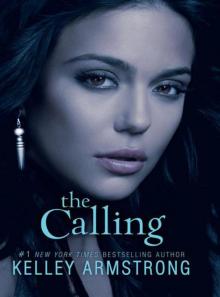 The Calling
The Calling Darkest Powers Bonus Pack
Darkest Powers Bonus Pack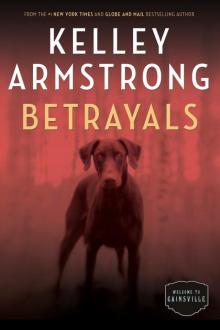 Betrayals
Betrayals Sea of Shadows
Sea of Shadows Rough Justice
Rough Justice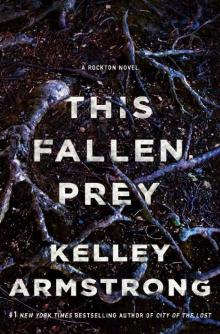 This Fallen Prey
This Fallen Prey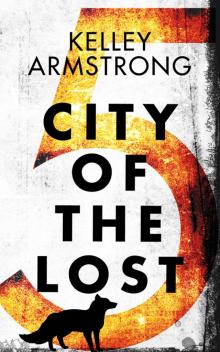 City of the Lost: Part Five
City of the Lost: Part Five Perfect Victim
Perfect Victim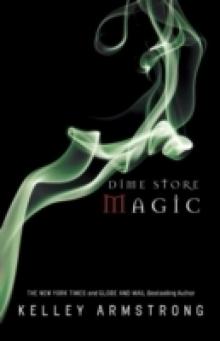 Dime Store Magic
Dime Store Magic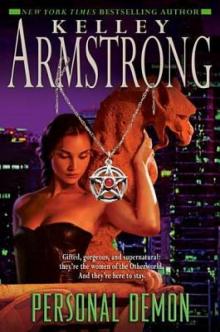 Personal Demon
Personal Demon Haunted
Haunted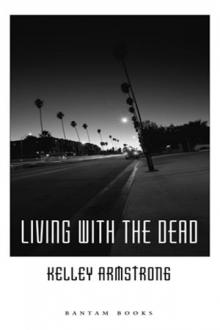 Living With the Dead
Living With the Dead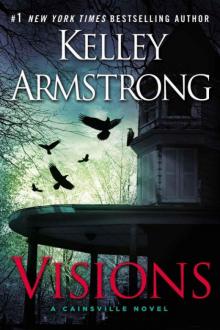 Visions
Visions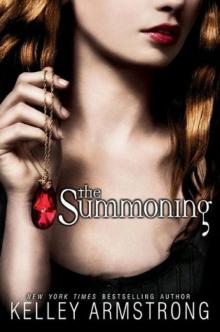 The Summoning
The Summoning Broken
Broken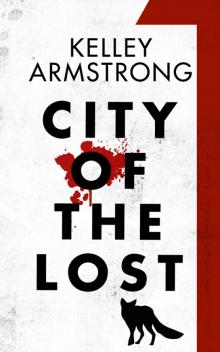 City of the Lost: Part One
City of the Lost: Part One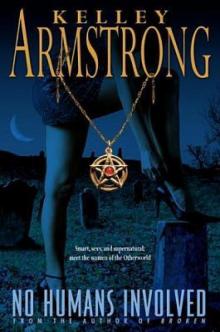 No Humans Involved
No Humans Involved The Awakening
The Awakening The Reckoning
The Reckoning The Gathering
The Gathering Bitten
Bitten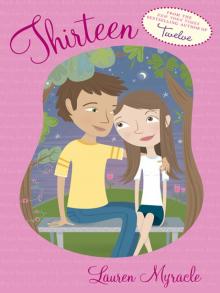 Thirteen
Thirteen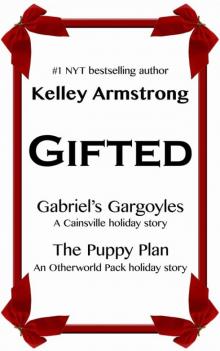 Gifted
Gifted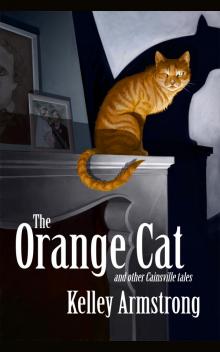 The Orange Cat and Other Cainsville Tales
The Orange Cat and Other Cainsville Tales Darkest Powers Bonus Pack 2
Darkest Powers Bonus Pack 2 Rituals
Rituals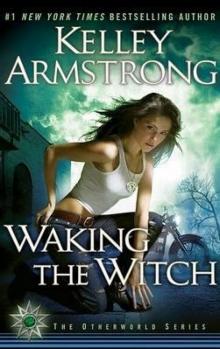 Waking the Witch
Waking the Witch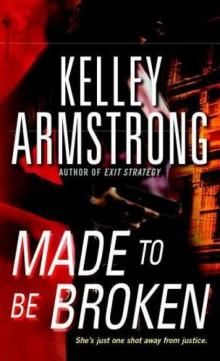 Made to Be Broken
Made to Be Broken Lost Souls
Lost Souls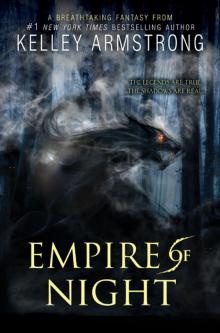 Empire of Night
Empire of Night Wild Justice
Wild Justice Double Play
Double Play Alone in the Wild
Alone in the Wild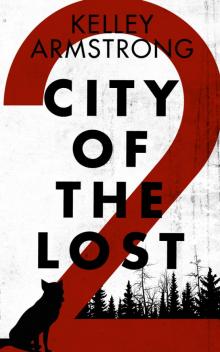 City of the Lost: Part Two
City of the Lost: Part Two A Stranger in Town
A Stranger in Town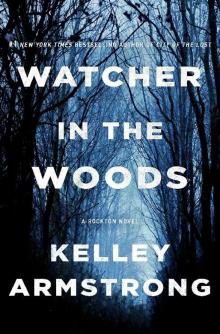 Watcher in the Woods: A Rockton Novel
Watcher in the Woods: A Rockton Novel Atoning
Atoning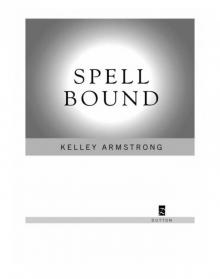 Spellbound
Spellbound Wolf's Bane
Wolf's Bane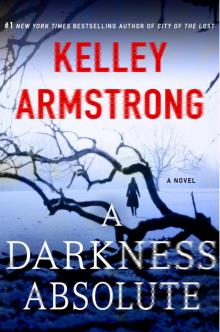 A Darkness Absolute
A Darkness Absolute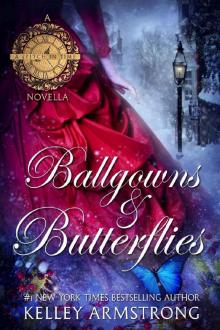 Ballgowns & Butterflies: A Stitch in Time Holiday Novella
Ballgowns & Butterflies: A Stitch in Time Holiday Novella Wherever She Goes
Wherever She Goes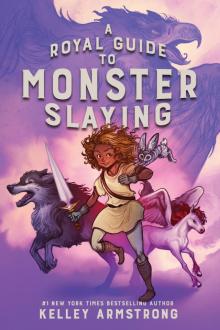 A Royal Guide to Monster Slaying
A Royal Guide to Monster Slaying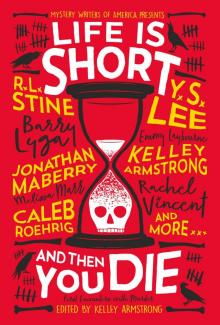 Life Is Short and Then You Die
Life Is Short and Then You Die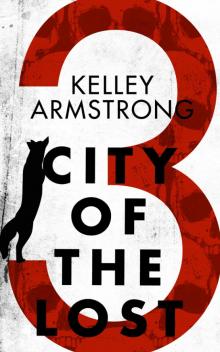 City of the Lost: Part Three
City of the Lost: Part Three Frostbitten
Frostbitten A Stitch in Time
A Stitch in Time Industrial Magic
Industrial Magic Wherever She Goes (ARC)
Wherever She Goes (ARC)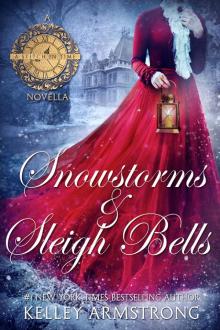 Snowstorms & Sleigh Bells: A Stitch in Time holiday novella
Snowstorms & Sleigh Bells: A Stitch in Time holiday novella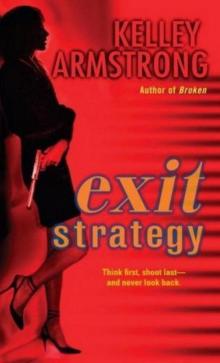 Exit Strategy
Exit Strategy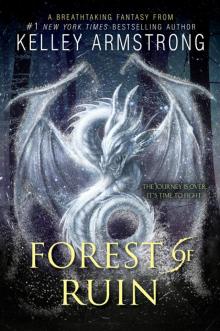 Forest of Ruin
Forest of Ruin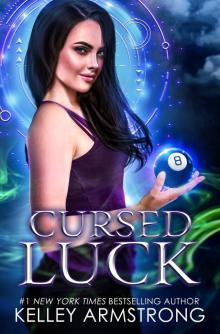 Cursed Luck, Book 1
Cursed Luck, Book 1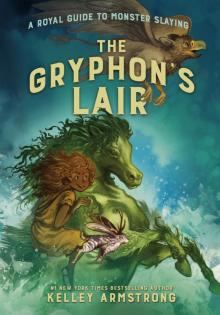 The Gryphon's Lair
The Gryphon's Lair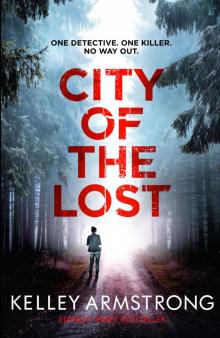 City of the Lost
City of the Lost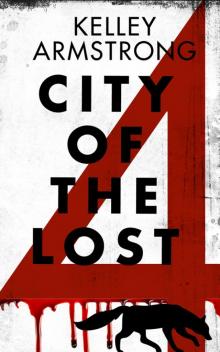 City of the Lost: Part Four
City of the Lost: Part Four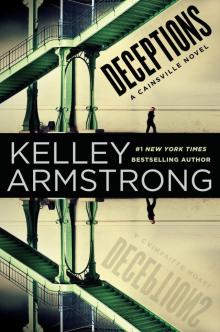 Deceptions
Deceptions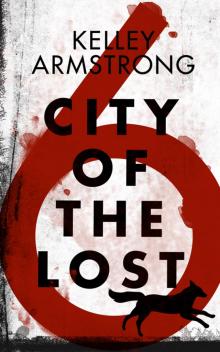 City of the Lost: Part Six
City of the Lost: Part Six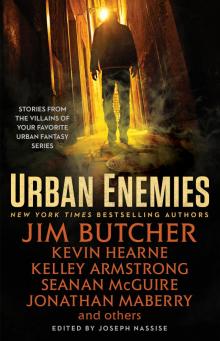 Urban Enemies
Urban Enemies Stolen
Stolen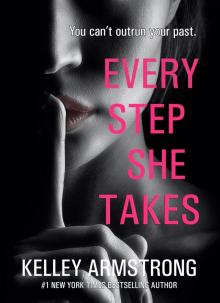 Every Step She Takes
Every Step She Takes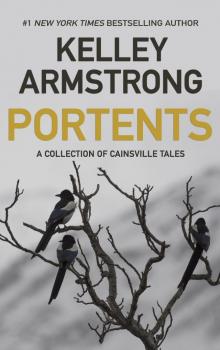 Portents
Portents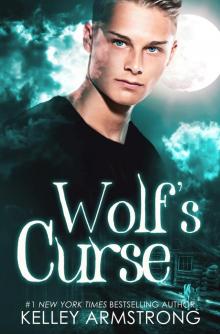 Wolf's Curse
Wolf's Curse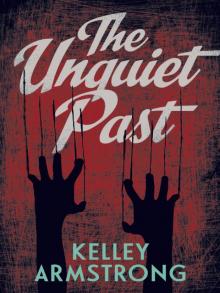 The Unquiet past
The Unquiet past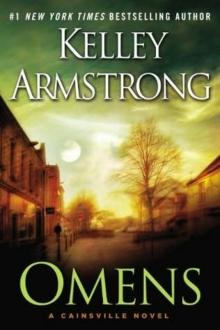 Omens ct-1
Omens ct-1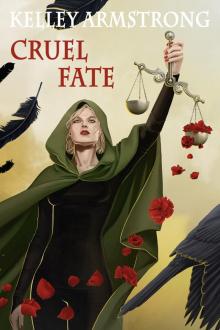 Cruel Fate
Cruel Fate The Calling dr-2
The Calling dr-2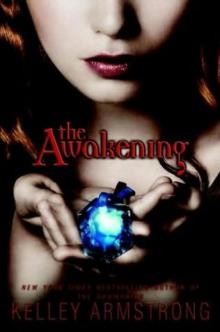 The Awakening dp-2
The Awakening dp-2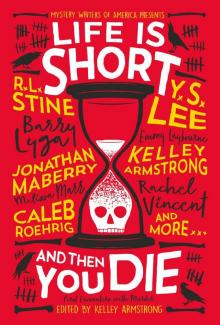 Life Is Short and Then You Die_First Encounters With Murder From Mystery Writers of America
Life Is Short and Then You Die_First Encounters With Murder From Mystery Writers of America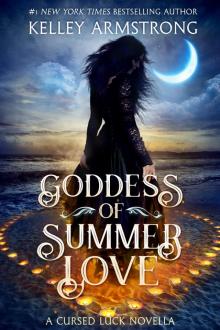 Goddess of Summer Love: a Cursed Luck novella
Goddess of Summer Love: a Cursed Luck novella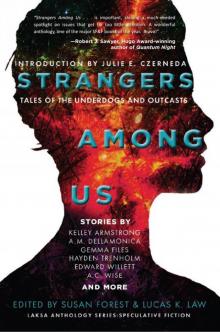 Strangers Among Us
Strangers Among Us The Gathering dr-1
The Gathering dr-1 The Rising dr-3
The Rising dr-3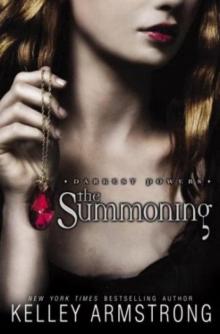 The Summoning dp-1
The Summoning dp-1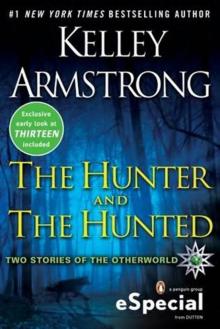 The Hunter And The Hunted
The Hunter And The Hunted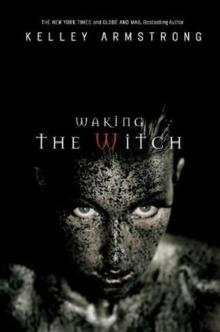 Waking the Witch woto-11
Waking the Witch woto-11